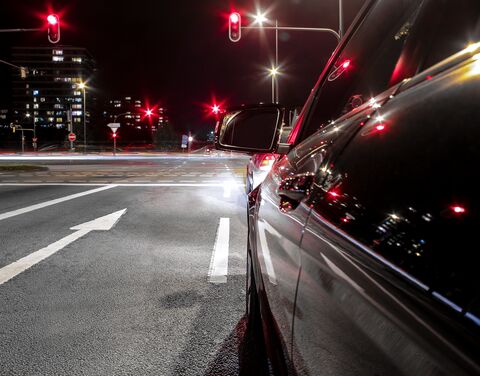
Gross negligence: How you can protect yourself and where the limits are
A distraction can quickly lead to an accident. But not every accident is treated the same. If gross negligence is involved, there can be serious consequences. We explain what gross negligence is, when it is deemed to have occurred, what the consequences are, and what it means for your insurance.
What does gross negligence mean?
Gross negligence means an especially severe error or breach of the elementary duty of care, which can lead to considerable damage or injury. In general, there is the assumption that situations in which someone is considered to have acted with gross negligence could have been prevented through increased attention.
One example of gross negligence while driving is intentionally running a red light or passing another vehicle on a curve with poor visibility. At home, an example of gross negligence would be leaving candles lit unattended on a Christmas tree. Unfortunately, gross negligence happens time and again. That’s why it’s all the more important to deal with the associated insurance questions.
The difference between negligence and gross negligence
Unlike minor or moderate negligence, gross negligence means the insured committed a very major or severe breach of their duty of care. The following are examples of gross negligence:
- Failure to comply with traffic rules: The deliberate and grossly negligent ignoring of traffic rules, such as exceeding the speed limit by a significant amount or running a red light, can be deemed to be gross negligence.
- Ignoring warning signs: If you deliberately behave in a way, despite clear warnings, that is considered high risk, this can be classified as gross negligence. One example is climbing fences or buildings despite the fact that there are clear signs indicating that it is dangerous.
- Breach of duty in your job: If a person is grossly negligent at work and violates recognized safety or professional standards, causing damage or injury, this can be deemed to be gross negligence. This can happen to doctors, for example, who make the wrong diagnosis, or construction workers, who ignore safety standards.
- Inattention: Actions or omissions in the household can also be deemed to be gross negligence. This includes, for example, a fire caused by a candle that wasn’t put out before leaving a rental apartment and which was left burning unattended.
Basis for liability in the Swiss Code of Obligations
When someone is liable for damage or loss that they have caused to someone else is governed in the Swiss Code of Obligations (SCO). One important provision is Article 41 of the SCO, according to which a person who causes harm or injury to another person through intent or negligence is liable for the damage or injury caused. This applies to minor negligence and gross negligence. The liability includes both material damage and immaterial damage (e.g. compensation for personal suffering or satisfaction). On the other hand, liability for motor vehicles is governed in Article 58 of the Swiss Road Traffic Act (RTA).
Consequences of gross negligence
Gross negligence can entail grave consequences. For this reason, it is important to know which conduct is considered to be grossly negligent to be able to avoid it and ensure your own safety as well as the safety of others. If gross negligence is ascertained in a claim, this can have major impact on insurance benefits. According to the law, in the event of an accident or damage caused by gross negligence, insurance can reduce benefits or reclaim benefits paid to the injured person who is deemed to have been the cause of the claim (this is referred to as gross negligence recourse).
Insurance protection in the event of gross negligence
Gross negligence has nothing to do with intentionally causing damage or injury. It can also happen by accident, for example by overlooking a street sign and causing an accident as a result. Even if a certain level of caution was taken, gross negligence with all the consequences can still happen.
Specifically, this means that the car insurance or liability insurance will normally reclaim a part or all of the costs from you if you acted in a grossly negligent way.
Insurance against gross negligence
To ensure that you are protected against the financial consequences in the event of a claim, you have the option of choosing a «gross negligence» add-on as supplementary insurance as part of your liability insurance, car insurance, or your household contents insurance. With this service, the insurance benefits of your insurance cannot be reduced or reclaimed from you if you caused damage or loss because of gross negligence (this referred to as a «waiver of recourse»). It is a good idea to have this protection against gross negligence or waiver of regress as you can avoid major financial disadvantages this way in the case of gross negligent behavior.
However, there are legally mandated exceptions to the waiver of recourse for which protection against gross negligence does not apply. For example, driving under the influence of alcohol or drugs or a flagrant violation of the permitted speed limit (generally known as «serious speeding»).
Frequently asked questions about gross negligence
Can my insurance claim recourse due to gross negligent behavior?
Yes, in some cases insurance can (or must) require a contribution of the liable insured or policyholder for the grossly negligent behavior. The amount of your contribution to the compensation can vary depending on the individual agreements and specific situation.
Who needs coverage for gross negligence?
Protection for gross negligence is worthwhile for anyone who wants additional insurance protection. In general, however, it is always suitable because a moment of inattention can happen to anyone. Regarding the costs, protection against gross negligence is much more cost effective than paying the costs incurred in the case of proven gross negligence.
How can you avoid grossly negligent behavior?
To avoid grossly negligent behavior, it is important to be aware of your own duty of care and act responsibly. This includes following traffic rules, complying with safety guidelines at work, careful handling of property, and an awareness for potential risks.
Which insurance policies should be supplemented with a «Gross negligence» module?
As a rule, the insurance against gross negligence is considered as an add-on to to personal liability insurance, household contents insurance, or motor-vehicle insurance.
- Personal liability insurance: With insurance against gross negligence, you can prevent the insurance from being able to reclaim the compensation payments from you in the event of a claim. Insurance against gross negligence offers additional security and prevents financial strain.
- Household contents insurance: If you cause damage to your apartment through gross negligence, you are protected through insurance against gross negligence against the insurance reducing benefits and having to pay for the damage incurred.
- Car and motorcycle insurance: Here, too, it can be a good idea to have insurance against gross negligence, since in the event of an accident the insurance will not try to reclaim the costs from you – even if you caused the accident.
Does liability insurance pay in the case of grossly negligent behavior?
Yes, it pays the damages to the injured person since this person has a direct right of claim against the insurance. However, the insurance can reclaim a portion of the benefits from the policyholder if they acted in a grossly negligent way.






